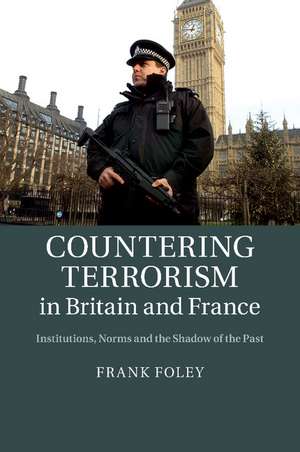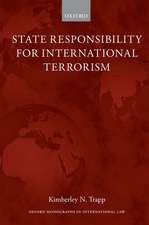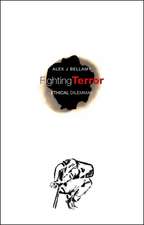Countering Terrorism in Britain and France: Institutions, Norms and the Shadow of the Past
Autor Frank Foleyen Limba Engleză Paperback – 31 dec 2014
| Toate formatele și edițiile | Preț | Express |
|---|---|---|
| Paperback (1) | 319.99 lei 6-8 săpt. | |
| Cambridge University Press – 31 dec 2014 | 319.99 lei 6-8 săpt. | |
| Hardback (1) | 852.96 lei 6-8 săpt. | |
| Cambridge University Press – 13 mar 2013 | 852.96 lei 6-8 săpt. |
Preț: 319.99 lei
Nou
Puncte Express: 480
Preț estimativ în valută:
61.24€ • 66.49$ • 51.44£
61.24€ • 66.49$ • 51.44£
Carte tipărită la comandă
Livrare economică 22 aprilie-06 mai
Preluare comenzi: 021 569.72.76
Specificații
ISBN-13: 9781107484153
ISBN-10: 1107484154
Pagini: 352
Ilustrații: 3 b/w illus.
Dimensiuni: 154 x 230 x 20 mm
Greutate: 0.47 kg
Editura: Cambridge University Press
Colecția Cambridge University Press
Locul publicării:New York, United States
ISBN-10: 1107484154
Pagini: 352
Ilustrații: 3 b/w illus.
Dimensiuni: 154 x 230 x 20 mm
Greutate: 0.47 kg
Editura: Cambridge University Press
Colecția Cambridge University Press
Locul publicării:New York, United States
Cuprins
Introduction; 1. Terrorist campaigns and threat perceptions; 2. Legacies of history: norms, institutions and routines; 3. Co-ordinating counterterrorism: intelligence, police and prosecution; 4. Justice for suspected terrorists?; 5. Operations: tackling Islamist terrorism and its supporters; Conclusion; Appendix: list of interviews.
Recenzii
'This is a thought-provoking and exceptionally well-researched book. It is essential reading for anyone interested in terrorism or European security.' Richard J. Aldrich, University of Warwick
'With impressive command of both history and theory, Frank Foley addresses a critical but surprisingly neglected question: why would two major Western democracies facing similar threats of terrorism respond so differently? His original and persuasive explanation, based on an astute analysis of Britain and France, is that national counterterrorism policies are filtered through dense layers of norms, institutions, experiences, and routines that produce divergent outcomes.' Martha Crenshaw, Senior Fellow, Center for International Security and Cooperation (CISAC), Stanford University
'In his outstanding book, Frank Foley shows convincingly how and why different institutions, norms and routines made Britain and France respond so differently to a common threat. This is a major scholarly study in a field too often predisposed to quick policy analysis.' Peter J. Katzenstein, Walter S. Carpenter, Jr Professor of International Studies, Cornell University
'[Foley] explains away dense and deadening legislation with a light touch, illuminating areas of contention with reference to popular cases. This makes an otherwise scholarly study readily accessible to a general audience.' The Spectator Online
'Countering Terrorism [in Britain and France] is the product of extraordinarily high-quality scholarship. Outstanding interview material - though often unidentified, for ethical reasons - is blended with a tight theoretical frame to produce an account that is persuasive and powerful.' Stuart Croft, European Political Science
'With impressive command of both history and theory, Frank Foley addresses a critical but surprisingly neglected question: why would two major Western democracies facing similar threats of terrorism respond so differently? His original and persuasive explanation, based on an astute analysis of Britain and France, is that national counterterrorism policies are filtered through dense layers of norms, institutions, experiences, and routines that produce divergent outcomes.' Martha Crenshaw, Senior Fellow, Center for International Security and Cooperation (CISAC), Stanford University
'In his outstanding book, Frank Foley shows convincingly how and why different institutions, norms and routines made Britain and France respond so differently to a common threat. This is a major scholarly study in a field too often predisposed to quick policy analysis.' Peter J. Katzenstein, Walter S. Carpenter, Jr Professor of International Studies, Cornell University
'[Foley] explains away dense and deadening legislation with a light touch, illuminating areas of contention with reference to popular cases. This makes an otherwise scholarly study readily accessible to a general audience.' The Spectator Online
'Countering Terrorism [in Britain and France] is the product of extraordinarily high-quality scholarship. Outstanding interview material - though often unidentified, for ethical reasons - is blended with a tight theoretical frame to produce an account that is persuasive and powerful.' Stuart Croft, European Political Science
Notă biografică
Descriere
Frank Foley presents the first in-depth comparative analysis of counterterrorist operations in two leading liberal democracies.















